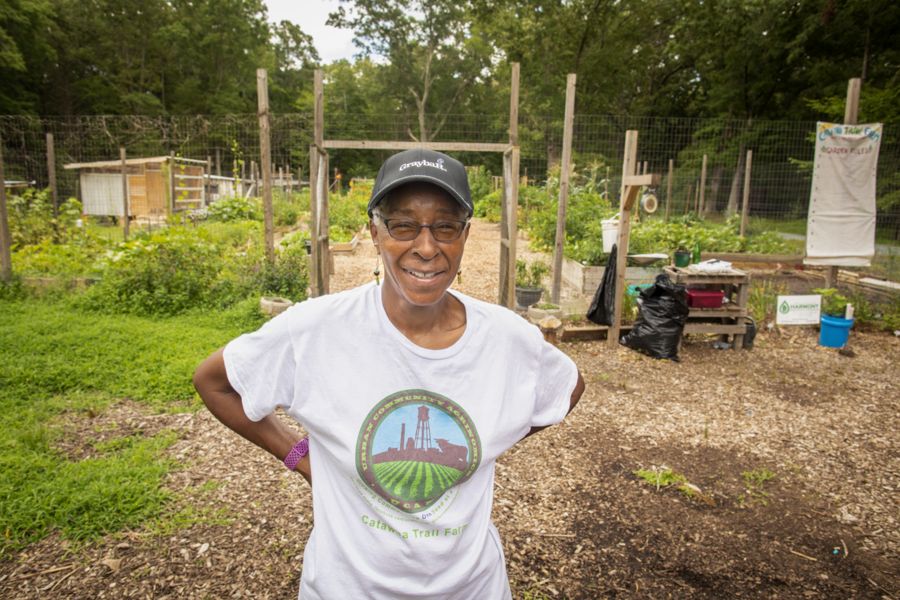Growing Crops, Building Community on a Former Plantation

Delphine Sellars at the Catawba Trail Farm in Durham.
DURHAM, NC – Technically Delphine Sellars is a retiree, but to say she keeps busy is a vast understatement.
“When I retired in 2016, I wanted access to land,” recalled Sellars. “I wanted a space where people could come together, learn, raise crops, and really feel close to the land.”
At the time, Sellars was a member of the Triangle Land Conservancy Board of Directors, and the group gave her new nonprofit called Urban Community AgriNomics (UCAN) access to an old farmstead known as Snow Hill IV Plantation in north Durham. Sellars and a small group of volunteers that included her sister, Lucille Godley Patterson, began the hard work of clearing the land and either restoring or disassembling old buildings in 2018. They renamed the site Catawba Trail Farm and harvested their first crops that summer. Today, the farm is a bustling community agriculture center with 47 raised garden beds rented and maintained by community members, a children’s garden, chickens that produce about 18 eggs a day, bees, fruit trees, and historic buildings that preserve the history of the farm and provide shelter, storage, and meeting space.
“This experience has been all about learning on your feet,” said Sellars, as she and a group of volunteers stacked boxes of produce to be picked up by community groups as part of a monthly communitywide food giveaway. “We had to learn about soil testing and clearing dead wood, well digging, and everything about how to restore land that hadn’t been farmed in 75 years.”
Sellars, who before her second career as CEO of UCAN served as the Durham County Extension Director, has secured a wide range of community funding for the site, including a stipend from the community gardening program at Cooperative Extension at N.C. A&T to enhance COVID-19 safety measures and provide technical support to gardeners. That stipend helped pay for raised garden beds and handwashing stations and paved the way for the additional community support from organizations such as the Conservation Fund in Durham, the Durham Chapter of Jack and Jill of America, and The Triangle Community Foundation.
“When you’re starting out, people don’t want to take a chance on you,” said Sellars. “Now we are getting the attention to do all the things we want to do. Extension’s support has helped make that happen.”
Extension at A&T provided stipends to 28 community gardens in 2021 and another 28 gardens in 2022. The stipend program is supported by a $206,000 grant from the Blue Cross and Blue Shield of North Carolina Foundation and another round of stipends will be awarded next year.

Members of Urban Community AgriNomics including John Nieman, left, and Michael Nye load visitors with fresh produce from North Carolina farmers during their free food distribution at Catawba Trail Farm in Durham County.
Catawba Trail Farm illustrates how those grassroots connections can work. The site’s monthly communitywide food distribution provides free fresh produce from North Carolina farms to individuals, nonprofits, and church groups. Educational programs have been offered on agriculture, horticulture, birding, composting, and environmental topics. And UCAN harnessed the youthful strength and endurance of the members of the Duke University Men’s Basketball team to build the raised beds in the children’s garden, called YouthCan.
Sellars and her UCAN volunteers also work to preserve the rich history of the site, which was once part of a sprawling plantation where enslaved African Americans worked, lived, and died. The farm got its name from the Catawba Indian Trading Path, which was a major Native American trade route in the 1700s and runs through the farm down to the Little River. Across the river and just to the north, the trail connects to Horton Grove, a nature preserve that was once an area of housing for slaves on the 30,000-acre plantation owned by the Bennehan and Cameron families. Horton Grove connects to Historic Stagville, a state historic site dedicated to teaching about the lives and work of the enslaved people on the plantation.
Sellars said UCAN is working to extend the existing trail so that visitors can walk from the historic sites where slaves labored in the summer heat to Catawba Trail Farm, where descendants of slaves work to restore part of their history and create a safe open space for community members to gather, grow crops, and learn about the environment and how to sustain the farm for future generations.
“My dream is that someone can start at Stagville, go to Horton Grove, and then connect to Catawba Trail Farm and see what the decedents of slaves have been up to,” said Sellars, “That’s the full circle. Our ancestors worked this land because they were forced to. We are here because we want to be here.”